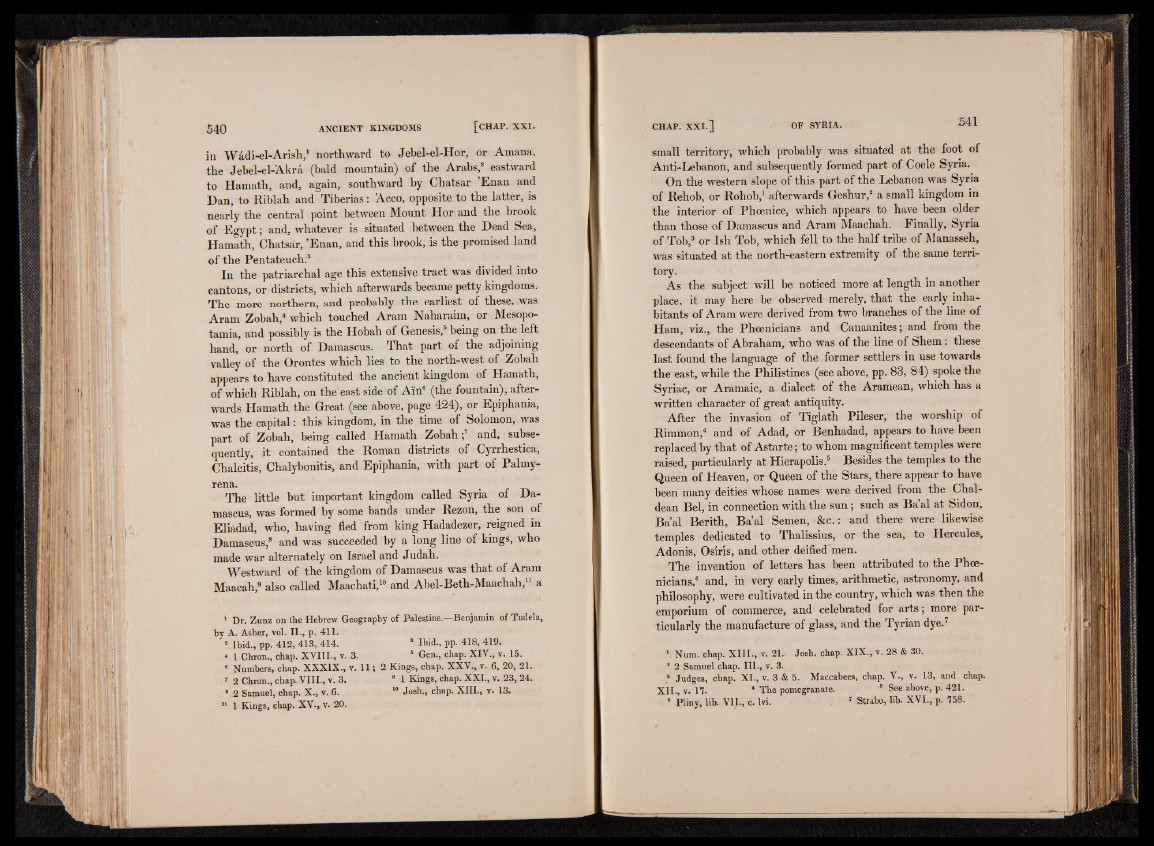
in Wadi-el-Arish,' northward to Jebel-el-Hor, or Amana,
the Jebel-el-Akra (bald mountain) of the Arabs,2 eastward
to Hamath, and, again, southward by Chatsar ’Enan and
Dan, to Riblah and Tiberias: Acco, opposite to the latter, is
nearly the central point between Mount Hor and the brook
of Egypt; and, whatever is situated between the Dead Sea,
Hamath, Chatsar, ’Enan, and this brook, is the promised land
of the Pentateuch.3
In the patriarchal age this extensive tract was divided into
cantons, or districts, which afterwards became petty kingdoms.
The more northern, and probably the earliest of these, was
Aram Zobah,4 which touched Aram Naharaim, or Mesopotamia,
and possibly is the Hobah of Genesis,5 being on the left
hand, or north of Damascus. That part of the adjoining
valley of the Orontes which lies to the north-west of Zobah
appears to have constituted the ancient kingdom of Hamath,
of which Riblah, on the east side of Ain6 (the fountain), afterwards
Hamath the Great (see above, page 424), or Epiphania,
was the capital: this kingdom, in the time of Solomon, was
part of Zobah, being called Hamath Zobah ;7 and, subsequently,
it contained the Roman districts of Cyrrhestica,
Chalcitis, Chalybonitis, and Epiphania, with part of Palmy-
rena.
The little but important kingdom called Syria of Damascus,
was formed by some bands under Rezon, the son of
Eliadad, who, having fled from king Hadadezer, reigned in
Damascus,8 and was succeeded by a long line of kings, who
made war alternately on Israel and Judah.
Westward of the kingdom of Damascus was that of Aram
Maacah,9 also called Maachati,10 and Abel-Beth-Maachah," a:
I Dr. Zunz on the Hebrew Geography of Palestine.—Benjamin of Tudela,
bv A. Asher, vol. II., p. 411.
' 8 Ibid., pp. 412, 413, 414. 8 Ibid., pp. 418, 419.
* 1 Chron., chap. XVIII., v. 3. 5 Gen., chap. XIV., v. 15.
e Numbers, chap. XXXIX., v. 11; 2 Kings, chap. XXV., v. 6, 20, 21.
7 2 Chron., chap. VIII., v. 3. 8 1 Kings, chap. XXI., v. 23, 24..
9 2 Samuel, chap. X., v. 6. 10 Josh., chap. XIII., v. 13.
II 1 Kings, chap. XV., v. 20.
small territory, which probably was situated at the foot of
Anti-Lebanon, and subsequently formed part of Coele Syria.
On the western slope of this part of the Lebanon was Syria
of Rehob, or Rohob,1 afterwards Geshur,2 a small kingdom in
the interior of Phoenice, which appears to have been older
than those of Damascus and Aram Maachah. Finally, Syria
of Tob,3 or Ish Tob, which fell to the half tribe of Manasseh,
was situated at the north-eastern extremity of the same terri-
tory.
As the subject will be noticed more at length in another
place, it may here be observed merely, that the early inhabitants
of Aram were derived from two branches of the line of
Ham, viz., the Phoenicians and Canaanites; and from the
descendants of Abraham, who was of the line of fthem: these
last found the language of the former settlers in use towards
the east, while the Philistines (see above, pp. 83, 84) spoke the
Syriac, or Aramaic, a dialect of the Aramean, which has a
written character of great antiquity.
After the invasion of Tiglath Pileser, the worship of
Rimmon,4 and of Adad, or Benhadad, appears to have been
replaced by that of Astarte; to whom magnificent temples were
raised, particularly at Hierapolis.5 Besides the temples to the
Queen of Heaven, or Queen of the Stars, there appear to have
been many deities whose names were derived from the Chaldean
Bel, in connection with the sun; such as Ba’al at Sidon,
Baal Berith, Ba’al Semen, &c.: and there were likewise
temples dedicated to Thalissius, or the sea, to Hercules,
Adonis, Osiris, and other deified men.
The invention of letters has been attributed to the Phoenicians,
6 and, in very early times, arithmetic, astronomy, and
philosophy, were cultivated in the country, which was then the
emporium of commerce, and celebrated for arts; more particularly
the manufacture of glass, and the Tyrian dye.7
T Num. chap. X III., v. 21. Josh. chap. XIX., v. 28 & 30.
1 2 Samuel chap. III., v. 3.
8 Judges, chap. XI., v. 3 & 5. Maccabees, chap. V., v. 13, and chap.
X II., v. 17. 4 The pomegranate. 5 See above, p. 421.
6 Pliny, lib. VII., c. lvi. 7 Strabo, lib. XVI., p. 758.